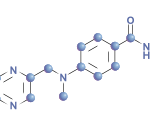Other long-term questions with tofacitinib relate to its safety profile, said Dr. Weinblatt. “We have two long-term observations with a small percentage having serious infections and some lab abnormalities that led to drug withdrawal,” he said. “This is an immunomodulating therapy, so seeing infections is not unexpected,” Dr. Weinblatt said. However, studies show that doses above 5 mg appear to be associated with more side effects, he said. This raises questions about differences in response and toxicity between tofacitinib 5 mg and 10 mg, he said.
There is also evidence of lipid elevation with tofacitinib use in some patients, he said.
R788
Presenters also discussed fostamatinib disodium (R788, Rigel Pharmaceuticals), an oral inhibitor of Syk kinase. This drug is currently in phase III studies at twice a day dosing, Dr. Weinblatt said. Fostamatinib has been studied for treatment of lymphoma, lupus, and type 1 diabetes.
Research with fostamatinib in RA has shown efficacy with some side effects, such as loose stools or diarrhea in 20% of subjects and an increase in blood pressure in 25% of subjects in one study. “Twenty-five percent needed antihypertensive therapy or needed to increase their dose [of antihypertensive therapy],” he said. However, at the end of the study, subjects’ blood pressure was identical to baseline.
Dr. Fleischmann said the risk for hypertension is not strong as long as clinicians are aware of the risk and treat it appropriately.
Another question about fostamatinib that has yet to be answered is whether it is efficacious in the same population as tofacitinib, Dr. Fleischmann said.
Looking Ahead to Future Use
Ultimately, time will tell how kinase inhibitors will add to the treatment options for RA, the presenters said. “These agents can be used before methotrexate or another DMARD, after methotrexate or another DMARD, before a biologic, after failure of a tumor necrosis factor–1 [TNF-1] agent, after failure of a second TNF-1, or after failure of one or more other biologic,” Dr. Fleischmann said.
He discussed several possible scenarios for kinase inhibitors. If all studies show efficacy and the cost of these drugs is similar to currently available biologics, then he believes methotrexate will still be the first DMARD used. “It works in a third of patients, and it’s cheap,” he said. “The first agent after methotrexate would be a TNF-1 because of their long history of efficacy and known safety profile. Plus, there is no cost advantage to using the oral agents.”

